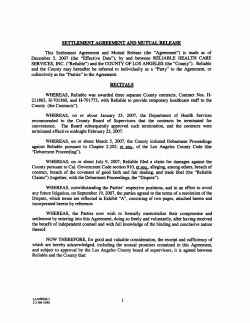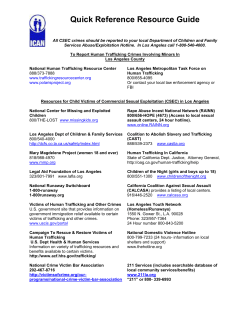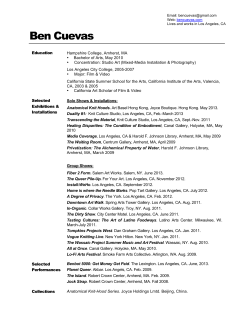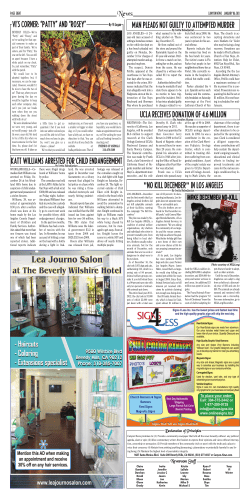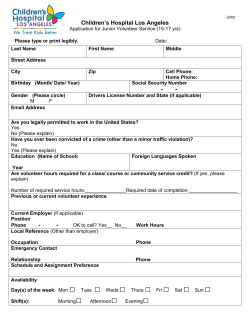
Document 193261
“How to be Your True Self” May 27, 2011 R. Scott Colglazier Senior Minister First Congregational Church Los Angeles, CA Scripture Reading – Philippians 4:8-13 I want to acknowledge this morning that this sermon title runs the risk of sounding like an empty cliché – How to be Your True Self. But I don’t mean for it to sound that way. In fact, I believe that there is a deep connection between finding our true self and finding God. When I am living into my true self, I am at peace with God. When I am living into my true self, I am happier, and consequently I make other people happier. When I am living into my true self, I feel as if I belong to the universe and that I am a child of God. But when I am not living into my true self, I feel estranged or alienated or disconnected. It’s as if my soul is a shattered car window. I feel jagged and disconnected from myself. I feel alienated from my friends and family. And I feel disconnected from my existence as a human being, and thus disconnected from God. And so, this isn’t just a “self-help” sermon; it’s really a theological sermon suggesting that if we live into our true self, we will find the presence of God. But how do we do that? I want to give you two ideas and one metaphor this morning, and then it’s really up to you to see if they are helpful. My first idea is this: the beginning point of the true self is that we are sons and daughters of a loving God, and not that we are sinners deserving of God’s condemnation and punishment. That sounds so simple, doesn’t it? Begin with love and not punishment. Yet, this one idea turns upside down about half the history of Christian theology. Where we start theologically inside our minds determines where we end up experientially in our hearts. There are some presentations of the Christian faith that go more or less like this – You are a sinner! (Note the exclamation mark.) That’s the beginning point. You are a sinner. You have done bad things. You are a bad person. You are unworthy. You are separated from God. You are in need of redemption. And if you’ll acknowledge that you are a sinner and confess your sins to God, then God will love you and forgive you and you will be saved forever! There are variations to this presentation, but in one form or another, this perspective has been part of the Christian tradition for two thousand years. Now, let me just say that there is some truth to this. Just enough truth to be dangerous. I mean, in truth, you are a sinner. And by the way, some of you are better at it than others. I am a sinner. We’re sinners in the sense that we all do things that are wrong. We say things that are wrong. We feel things that are wrong. We treat one another in ways that are wrong. Yet my question is this: why does that have to be the beginning place of our faith? If you start there, then that means you start with an angry God. Or a punishing God. Or a judging God. And, to me, if I understand anything about the message of Jesus, that is not the starting place. 1 Again and again, Jesus revealed a God willing to love, even to the point of God’s own suffering on a cross. More than that, you can go back all the way to the creation story of Genesis, and there you see that God created human beings in God’s image. Think about that. We are born into this world and carry within us the beauty of God. That means you are a child of God. You come into this world loved and accepted and cherished by God. That’s the place to begin. And so, for us to live into our true selves is not about becoming what we are not; it’s really about returning to who we really are. Now, I don’t do this very often, but it’s a holiday weekend and half the church is up at Cedar Lake or on vacation, and so I’m going to invoke a personal point of privilege this morning. Let me tell you about my granddaughter. Her name is Caroline. I don’t get to see her very much because she lives in Indiana, but let me tell you, the minute she entered this world, she belonged to us. She entered this world being loved. Being celebrated. And if I have my way in a few weeks, she’ll also be wonderfully spoiled by her G-Daddy! She didn’t have to earn anything with us. She didn’t have to prove anything with us. She didn’t have to achieve anything for us. By virtue of birth, she is special. And that’s her starting point in life. She’ll go on and make mistakes, of course. She’ll have her heartaches, of course. But her true self, her spiritual inner child, is love and wholeness and goodness. And that’s your starting place with God. How do you discover your true self? I think we begin nurturing, in thought and prayer and awareness, that we are children of God, and that we are loved by God and that we are accepted by God. And that our true self, or real self, is beautiful. And joyful. And free. And that the spiritual journey, at least partly, is finding ways to nurture that inner child within us all. That’s the most important beginning point you’ll ever find. Anything else does damage to the human spirit, and that’s true even if it’s cloaked with the authority of religion. The second idea is this: God wants you to be a real person. That is to say, real versus fake. Real versus superficial. Real versus hidden. Real versus unaware. To be real means we’re in touch with what we are feeling, what we are thinking, and what we are doing with our lives. The truth of the matter is, we can live a good part of our lives and never really discover the real self. To me, that is one of the great tragedies of life. We go through an existence, but never know who we are. Maybe you can think about it like this: all of us were handed scripts by our families. Those scripts are titled – Here’s how to be a good daughter… Here’s how to be a good son… This is what a woman is… This is what a man is… This is what success looks like… This is what failure looks like… This is what religion looks like... This is what an American does... This is what an immigrant does... This is what sexuality looks like… This is what marriage a looks like... And in many cases, there is nothing wrong with these scripts. In some cases, we would do well to return to a few of them. But the problem becomes when we follow the script without any thought or awareness about what we really think or feel or how we should really live. Spirituality is the life-long process of becoming a real human being. The psychologist Carl Jung had a word for it; he called it individuation. Individuation is the process of integrating the conscious and unconscious parts of our lives. It’s the process of 2 sorting through the scripts – what we will keep and what we’ll not keep – and in so doing we begin to write our own script. The one God wants us to write. I believe with all my heart that this is what God wants us to do. God doesn’t want you to be like me. God doesn’t want me to be like you. God wants us to find the faith and courage and honesty to be real with ourselves. And yet, my hunch is that when it comes to Christianity, most people have the impression that the point of faith is to either be a good person or a nice person. Right? Come to church and do your best to be a good person or a nice person. That pretty much summarizes the message. Don’t misunderstand what I’m about to say. I think we should be good people. So don’t stop. I like it when people are nice to one another. That’s a good thing too. Don’t stop. But here’s the kicker – you can be nice and a complete phony. You can be good and have no idea who you are or what you are about as a human being. I remember reading a line in a novel by Peter DeVries years ago, and it said, “He was a good man, in the worst sense of the word.” He also described a character by saying, “Deep down, he was really shallow.” Finding the true self means that deep down, we’re actually really deep. What I’m saying is that the journey we take toward the real self is the most sacred journey we’ll ever take. I think this was part of the charisma of Jesus. He had the courage to be a real human being, and people were drawn to it like moths flying toward a porch light. And if Jesus were here today, I think he would say to us, “Don’t merely be attracted to my light; you need to find the light of your true self. That’s the place where you will find God.” Okay, those are the two ideas about the true self: start with love and not judgment, and focus on honoring your true self and not following the scripts of others. And now for the metaphor; it’s the word resonance. Isn’t that a great word? Resonance. Embedded in the word resonance is the word sound or sonic or sonar. When sounds resonate, they come together in a lovely and beautiful way. One sound is joined with another sound, and together they create something even more beautiful than what they were separately. Here’s what I’m saying: we discover the true self when we pay attention to what resonates in our lives. And just as importantly, we pay attention to what doesn’t resonate. We do this with people. If you have a couple of people in your life with whom you really resonate, count your blessings because it is rare. Beautiful but rare. How is it that two people can read the same book, and one person loves it and another person hates it? The difference is resonance. Or you go to a place like Paris, and you love it. You resonate with everything. The food. The people. The bridges crossing the Seine. And another person goes to Paris, and they find it gray and old and depressing, and they can’t wait to get back to America. The difference is resonance. If you want to find your true self (and it’s not like finding your car keys, trust me, it’s a process) but if you want to find your true self, begin to pay attention to what resonates within your life. That doesn’t mean you only do things that you like, or 3 hang out with people you already know, or keep repeating the same fulfilling, but predictable, experiences. Some resonate experiences take time. If you dismiss them too early, you’ll miss some of the best stuff of life. But part of our journey to God means paying attention to what resonates within. It’s mystery. It’s meaning. It’s grace. And we honor God best when we pay attention to what resonates. I was talking to a friend the other day, and he runs a little wine store over in Silver Lake. I had heard he was opening up another store in Pasadena, and so I asked him about it. But he said something to me that I found wonderfully insightful, and actually a little inspiring. He said, “Yes, my business partners are opening a new store, but I’m not a part of that. I’m sixty years old. I’m in good health. And I want to pay more attention to my photography. And also to my music. I’m at a place in life where I need to do some different things.” That’s resonance. He knows what resonates in his life and what doesn’t. Making more money would be great. A new business would be exciting. But that means working night and day at two different places, and where he is now in life, he needs to do something else. What I’m saying to you is that if you want to find your true self, you have to pay attention to what resonates. All right, that’s my “how to” series for the month of May. I hope you have a good Memorial Day weekend. Be your true self. Be your best self. And most of all, pay attention to what resonates. That’s where you find the Spirit. I love you all. Amen. Rev. Dr. R. Scott Colglazier, Senior Minister Rev. Ryan Steitz, Associate Minister, Rev. Shanna Steitz, Associate Minister, Curtis Rhodes, Director of Programs, Dr. Jonathan Talberg, Director of Music & Stewart W. Foster, Organist in Residence Sermons are printed each week as a courtesy to the members and friends of First Congregational Church of Los Angeles. No part of the sermons may be reproduced without permission from Dr. Colglazier. FIRST CONGREGATIONAL CHURCH of LOS ANGELES Wilshire Center 540 South Commonwealth Ave. Los Angeles. CA. 90020 T. 213.385.1341 www.fccla.org 4
© Copyright 2026





